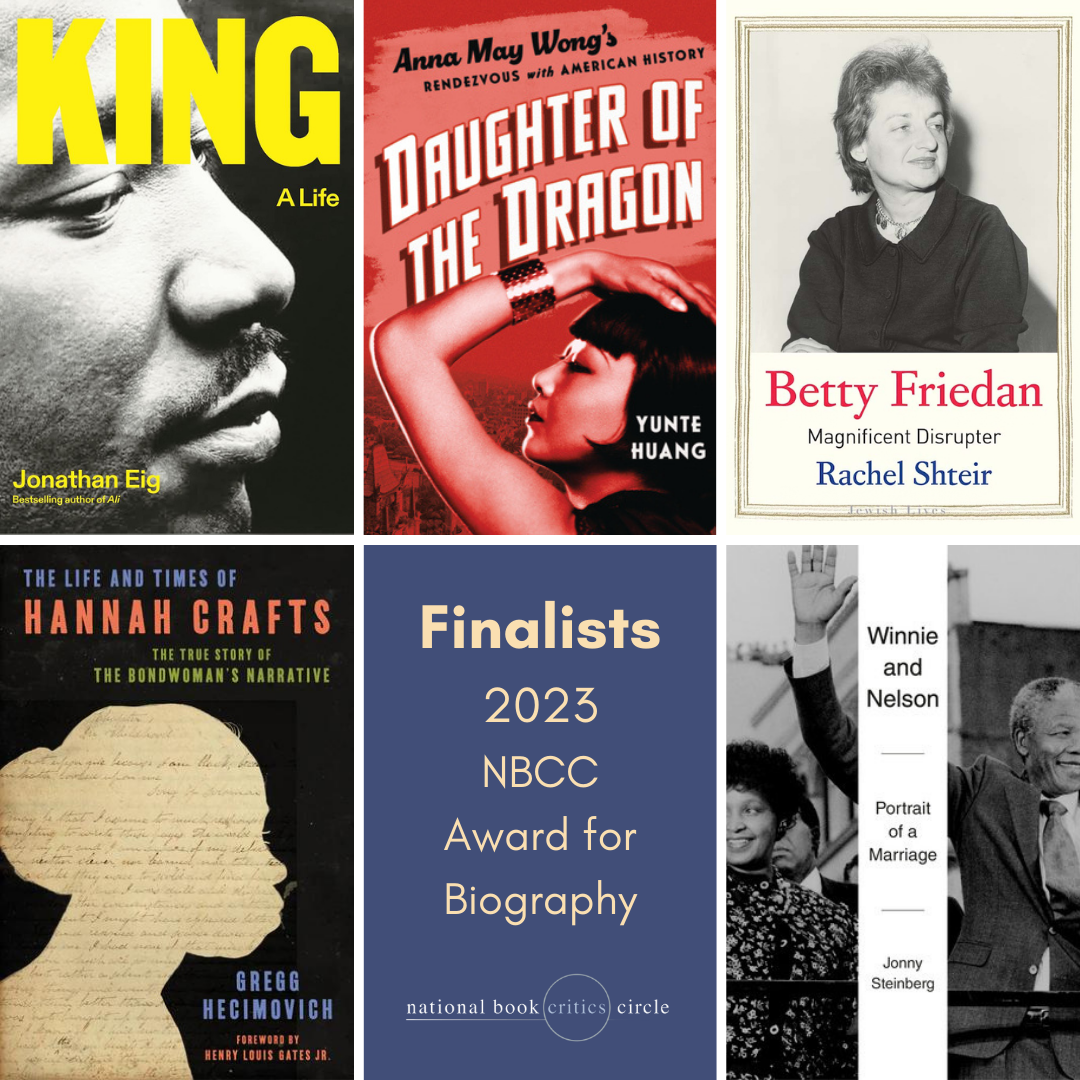Each year, our board members write citations of the finalists for the National Book Critics Circle Awards in a feature we call 30 Books in 30 Days. We’re honored to continue this year’s edition with brief reflections on the finalists in our biography category.
Jonathan Eig, King: A Life (Farrar, Straus and Giroux)
In his sweeping biography of Martin Luther King Jr. Jonathan Eig recovers the civil rights leader from “the gray mist of hagiography.” Eig traces the arc of “Little Mike,” son of a Georgia sharecropper, to national prominence as an eloquent advocate for Black rights, as well as a crusader against the Vietnam War and poverty, all the way to Memphis and the Lorraine Motel balcony. Building on more than 200 interviews and recently released FBI files, Eig recently made national news by debunking a famous quotation about Malcolm X attributed to King, tracking fissures in the civil rights movement, and revealing King’s womanizing. With the velocity of a thriller, Eig evokes King in all his complexity, an imperfect but extraordinary man.
Gregg Hecimovich, The Life and Times of Hannah Crafts: The True Story of the Bondwoman’s Narrative (Ecco)
The Bondwoman’s Narrative, written in the mid-nineteenth century and believed to be the first novel by a Black woman, caused a sensation when it was authenticated and published by Henry Louis Gates Jr. in 2002. Until now, however, the author’s identity remained a mystery. In this compelling new biography, Hecimovich combs through public records, handwritten diaries, almanacs, wills, and slave inventories and invites readers into his search, even the dead ends, to reveal Crafts as the former Hannah Bond, a child traumatically separated from her enslaved mother, who learned to read and write before escaping to the North and completing the book. Hecimovich convincingly demonstrates that Crafts’ writing was influenced by popular literature, in particular Dickens’ Bleak House, yet stands, sui generis, as what he calls “one of the most powerful imaginative records we have of slavery.”
Yunte Huang, Daughter of the Dragon: Anna May Wong’s Rendezvous with American History (Liveright)
Daughter of the Dragon provides a riveting glimpse into the life of the beguiling actress Anna May Wong, one of Old Hollywood’s most recognizable faces. The book is the triumphant capstone to an ambitious trilogy: here, as in previous installments on Charlie Chan and the original Siamese twins (both NBCC finalists), Huang shines his spotlight upon a single, iconic figure in order to reveal a bigger picture. This dramatic account of Wong’s ascent to silver screen stardom—and subsequent descent into alcoholism and oblivion—thoughtfully illuminates the crucial role played by Asian Americans in the spectacle of modern culture.
Rachel Shteir, Betty Friedan (Yale University Press)
In Betty Friedan, Rachel Shteir investigates the life, work and complex legacy of the trailblazing feminist. While Friedan remains respected for her contributions to early second wave feminism, her resistance to intersectional feminist work leaves her out of sync with contemporary feminist activism. The first biography of Friedan in a generation, drawing on extensive research and interviews with Friedan’s contemporaries, Shteir examines the ways in which Friedan’s early years growing up Jewish in the midwest and living in the shadow of her mother’s thwarted education, shaped her ambition, career trajectory and personal life. The determination that led Friedan to become a forceful national leader also closed her off from compromise and evolution. In this timely, important biography, Shtier makes the case that her impact remained crucial to social change in 20th century America.
Jonny Steinberg, Winnie & Nelson: A Portrait of a Marriage (Knopf)
Jonny Steinberg’s deeply insightful, painstakingly researched Winnie and Nelson: A Portrait of a Marriage unmasks the Mandelas, sliding past their public mythos, and the simpler romantic narrative they told each other, to reveal the emotional labyrinth beneath. Steadily, through newly recovered material about the couple’s conversations – gathered by eavesdropping Afrikaner prison guards – Steinberg reveals how incarceration, torture, infidelity, and time itself, changed both husband and wife and their political stances. We’re left with a strong sense of the horrors they endured during apartheid, and the tenderness that remained between them at the end, even after they had inflictied pain on one another, and enduried so much cruelty and torture. With its exploration of two radically different approaches to apartheid, this beautiful biography speaks movingly to present-day struggles for racial justice.


